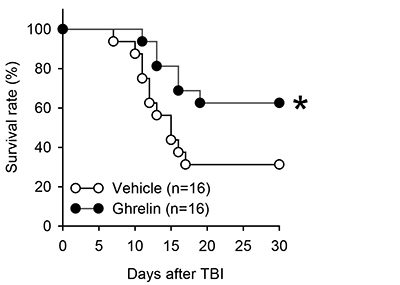Exposure to high doses of radiation can occur after accidental exposure to radioactive materials, a natural disaster or technical accident at a nuclear facility, or the detonation of a radioactive device or nuclear bomb. Depending on the dose of radiation received, individuals develop acute radiation syndrome (ARS, also known as radiation sickness). The bone marrow cells that originate blood cells and the epithelial cells that line the digestive tract are particularly affected in ARS. While the existing countermeasures to mitigate ARS are somewhat effective for bone marrow recovery, they do not improve clinical outcomes or the survival rate of individuals with gastrointestinal ARS.
Ghrelin is a gastric hormone that regulates appetite and energy metabolism. Ghrelin also increases protein synthesis, promotes cell renewal and proliferation, and decreases cell death. Ghrelin’s action on the brain activates the vagus nerve, which increases blood flow to the gut, promotes gastrointestinal motility and digestion, and also regulates inflammation and the immune system.
Read more about human ghrelin.
Preclinical studies:

Ghrelin increases survival in experimental model of total body irradiation (TBI) injury. Treatment with human ghrelin improved the 30-day survival rate after TBI from 31% to 63%. Vehicle (normal saline) or human ghrelin (20 nmol) was administered subcutaneously once a day for 6 days staring at 24 h after TBI. Survival rates were estimated using the Kaplan-Meier method (n=16/group), and compared using the log-rank test; *P < 0.05 vs. vehicle.
